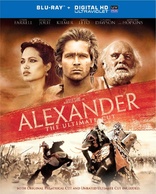Alexander Blu-ray Movie
HomeAlexander Blu-ray Movie 
Blu-ray + UV Digital CopyWarner Bros. | 2004 | 1 Movie, 2 Cuts | 383 min | Unrated | Jun 03, 2014
Movie rating
5.9 | / 10 |
Blu-ray rating
| Users | 3.5 | |
| Reviewer | 3.5 | |
| Overall | 3.5 |
Overview
Alexander (2004)
Oliver Stone's "Alexander" is based on the true story of one of history's most luminous and influential leaders – a man who had conquered 90% of the known world by the age of 25. The film chronicles Alexander's path to becoming a living legend, from a youth fuelled by dreams of myth, glory, and adventure, to his intense bonds with his closest companions, to his lonely death as a ruler of a vast empire.
| Action | 100% |
| Adventure | 59% |
| Epic | 56% |
| History | 53% |
| War | 51% |
| Drama | 33% |
| Biography | 24% |
Specifications
Video
Video codec: MPEG-4 AVC
Video resolution: 1080p
Aspect ratio: 2.40:1
Original aspect ratio: 2.35:1
Audio
See individual releases
Subtitles
English SDH,French,Italian SDH,Portuguese,Spanish,Czech,Hungarian
Discs
50GB Blu-ray Disc
Two-disc set (2 BDs)
UV digital copy
Packaging
Slipcover in original pressing
Playback
Region A, B (C untested)
Review
Rating summary
| Movie | 3.0 | |
| Video | 4.0 | |
| Audio | 4.5 | |
| Extras | 4.5 | |
| Overall | 3.5 |
Alexander Blu-ray Movie Review
Reviewed by Michael Reuben June 7, 2014Good trial attorneys never say to a witness, "I just have one more question", because they may have to go back on their word. What if something else important occurs to them during the witness' answer? Similarly, Oliver Stone probably shouldn't have called his 2007 extended version of Alexander "The Final Cut", especially given Stone's well-established penchant for tinkering with his films. He also should have left himself some wiggle room in the note included with the two-disc DVD set, where he said: "[R]est assured this is my last pass, as there is no more footage to be found" (emphasis added). Sure enough, seven years later, here comes the writer/director, on Alexander's tenth anniversary, with yet another "pass". This one is entitled Alexander, The Ultimate Cut, presumably because the word "final" was already taken, but maybe filmmakers and studios should quit using such definitive names for these works-in-progress. Who knows whether this is the last Alexander? Think of this as The 2014 Special Edition. In total, Stone has released four versions of a project that was his life-long ambition. His biographical portrait of the enigmatic Greek hero known as Alexander the Great now exists in:
- a Theatrical Cut released in 2004;
- a Director's Cut released on DVD simultaneously with the Theatrical Cut in 2005;
- the so-called Final Cut from 2007; and
- the Ultimate Cut.
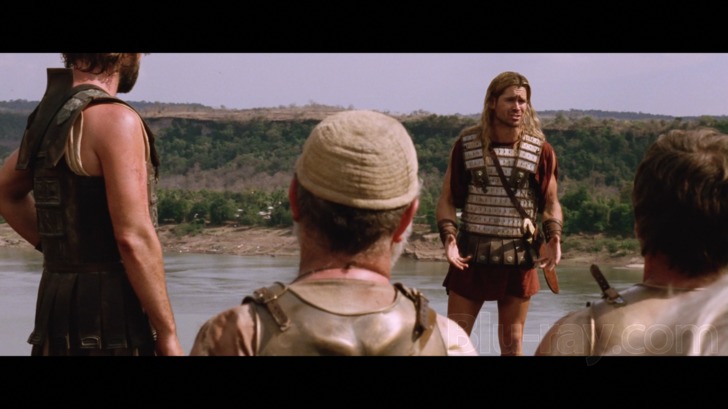
Stone attempts to tell, so far as it can be known, the life story of a young man who, in his mid-twenties, conquered the entire known world across Europe and Asia. In so doing, Alexander reimagined warfare and battle tactics, invented the notion of empire that the Romans would perfect and expanded the concept of "society" beyond an individual's immediate town or city. By unifying the world as a conqueror, he invented it as the concept we know today. He also became the first "celebrity ruler". His status as a legend was cemented by an early death just shy of his thirty-third birthday. Stone sought to explore all of these challenging themes—and on top of them, to take on Alexander's essential loneliness, his complex sexuality, his tortured relationships with his parents (who hated each other) and the contradictory role of the visionary in society, a theme that has intrigued Stone ever since The Doors. That's an ambitious underaking, and Stone's biggest challenge as both writer and director was selecting a focus. A "dramatist" (as Stone calls himself in his commentary) has to choose his priorities. He has to decide what story elements will provide the "spine" or "through line" that will keep an audience grounded, engaged and absorbed. Then, if the dramatist is skilled enough, other elements can be folded in as subtext, not all of which has to be perceived on an initial viewing. Indeed, the best and most durable dramatic and cinematic works are those that reveal hidden dimensions on repeat viewings. Still, the work must play well on that initial encounter. Otherwise, the audience won't come back to discover the subtext. In Alexander's Theatrical Version, Stone took the most common approach for a biographical portrait by proceeding in (mostly) chronological order, taking Alexander from young boy to man and leader and dramatizing several of his major campaigns. As an introduction, the Theatrical Version opened with a brief scene of Alexander on his deathbed and a speech, many years later, by one of his generals, Ptolemy (Anthony Hopkins), now an old man dictating his memoirs. Through Ptolemy's introduction, we are provided an overview of the immense destiny toward which the young Alexander (first Jessie Kamm, then Connor Paolo) is heading, as we watch him being pulled back and forth between his irascible, one-eyed father, Philip (Val Kilmer), King of Macedonia, and his scheming mother, Olympias (Angelina Jolie), a suspected witch who claims that Alexander's real father is the god Zeus. For just over half an hour, we experience the young Alexander's education under the great philosopher Aristotle (Christopher Plummer), his physical training by a wrestling coach (Brian Blessed), and his growing friendship with the young Hephaistion (Patrick Carroll), who becomes Alexander's closest friend, because Hephaistion won't let him win in the ring just because he's the prince. It's the beginning of a life-long relationship in which Alexander can always trust Hephaistion to tell him the truth. Meanwhile, both of his parents, each with their own designs, fill Alexander's head with tales of legendary Greeks like Achilles and Heracles (a/k/a Hecules), while Alexander dreams of joining these names in the annals of glory. The only major departure from chronological order in the Theatrical Cut is Alexander's ascension to the throne after Philip's death. Stone saves that for a major flashback near the end of the film, in part because it also marks Alexander's estrangement from his domineering mother, who thereafter becomes a reproachful voice in his head, through her letters from Greece. "It's a high ransom she charges for nine months lodging in the womb", says the adult Alexander (Colin Farrell) to Hephaistion (played as an adult by Jared Leto). Otherwise, with occasional narration from old Ptolemy, the Theatrical Cut follows Alexander on his many campaigns in the East, including his distinctive habit of founding cities named Alexandria and recruiting those he conquered into his empire and army. The latter practice often leads to disgruntled muttering among his generals, who consider plunder and enslavement to be their due. As often as his soldiers cheer Alexander, they also come to doubt his vision. Feuds, mutinies and plots become as much a part of his campaigns as actual battle, all of which reinforces Alexander's sense of isolation. (Marriage to a barbarian woman named Roxane, played by Rosario Dawson, only leaves him feeling more alone.) Following a harsh and bloody campaign in India, Alexander returns to Babylon, where he dies; whether of typhus or poison is unknown. Having failed to name a successor, he leaves a squabbling clan of generals behind, and his empire is quickly dismantled. The campaign in India is the occasion of the second of two major battles showcased in Alexander. The first occurs shortly after Alexander has ascended to Philip's thrown, when he invades the Persian Empire ruled by Darius III (Raz Degan). In the historic Battle of Gaugamela, Alexander leads his forces to victory against a much larger Persian opposition, removing Darius from the throne and reshaping the map of the known world. Stone stages Gaugamela with all the kinetic energy of a master filmmaker, which is no mean feat, because the battle involved complex military tactics in which Alexander split his army into several flanks to divert key portions of the Persian army. If the audience has no sense of who the generals are when they are implementing the commander's instructions, the result appears as confusion, not military genius. And confusion is exactly what Stone offers in the Ultimate Cut, where he has moved the Battle of Gaugamela to the beginning, in contrast to the Theatrical Cut, where it occurs more than half an hour into the film, after viewers have had a chance to get acquainted with key fighters like Hephaistion, the young Ptolemy (Elliot Cowan), Cassander (Jonathan Rhys Meyers), Parmenion (John Kavanagh) and his son, Philotas (Joseph Morgan), Crateros (Rory McCann) and Cleitus (Gary Stretch). In the Ultimate Cut, as the two armies confront each other, and the generals ride back and forth while the screen flashes titles like "Macedonian Left" and "Macedonian Center", the viewer is left to guess who's who (except for Alexander and Darius) and exactly what they're doing. The great battle that initially served as the climax of the film's first act has now become its half-hour introduction: a swirling confusion of warriors, armament, dust and the eagle that flies over the battlefield representing the Olympian eye of Zeus. The entire rest of the Ultimate Cut proceeds in a zig-zag fashion, leaping backward and forward in time, with the scenes of Alexander's boyhood parceled out over the length of the film and the action constantly interrupted by flashbacks and flash-forwards. Titles proclaiming "X Years Earlier" and "Y Years Later" multiply so rapidly that one quickly gives up trying to follow the timeline. Key portions of the old Ptolemy's speech that helped launch the Theatrical Cut by explaining Alexander's importance have now been moved to the very end of the film, where it serves as a summing up instead of an introduction. But if the film has done its work, that kind of summing up shouldn't be necessary. One can debate the merits of specific additional footage and of various editorial changes, but Stone's larger decision to depart from chronological order—which began with the Final Cut—is the act of a storyteller who has become so immersed in his material that he neglects the audience. Most contemporary viewers know little about the culture of ancient Greece and even less about Alexander the Great. It is Stone's job as a storyteller to lead such viewers into this world, familiarize them with it, intrigue them, then show them why this atypical man is someone they should care about. Despite many lapses and imperfections, the Theatrical Cut made such an effort. The Ultimate Cut is strictly for the initiated. It's as if Stone were trying to bring to the surface all the subtext he thinks people missed in the Theatrical Cut, but in the process forgot that he is also supposed to tell a coherent story.
Alexander Blu-ray Movie, Video Quality 
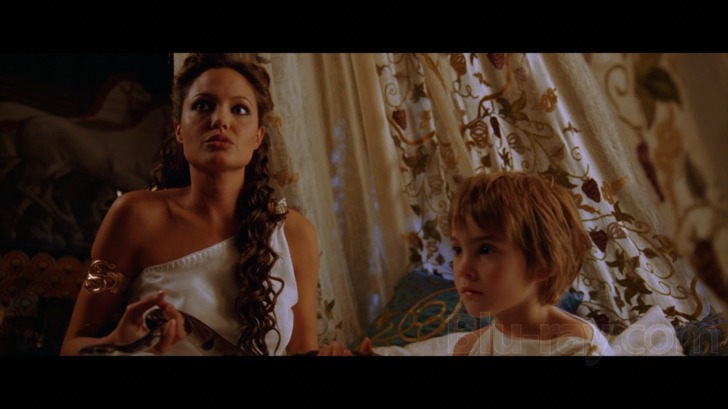
Alexander was shot by the fine Mexican cinematographer Rodrigo Prieto, who recently shot The Wolf of Wall Street for Martin Scorsese, having previously lensed Stone's Wall Street sequel, Money Never Sleeps. The film was finished at 2K on a digital intermediate, from which the Theatrical Cut's Blu-ray was presumably sourced. No information was available on the provenance of the Ultimate Cut, but the lack of any inconsistency between added and original footage strongly suggests that it, too, was sourced from digital files. Stone made extensive use of digital effects, not only to recreate ancient cities such as Babylon and Alexandria, but also to multiply crowds and armies, as well as enhancing gore effects and changing color saturations to reflect emotional shifts in the story. (Stone points out many of these moments in his commentary.) The two 1080p, AVC-encoded Blu-rays included in this set have a consistent look and feel, such that scenes occurring in both of them look essentially the same (although so many small editing changes have been made that synching up a scene is a challenge). The image is finely detailed, within the limits of a 2K source, and sharp without the harshly digital edges that sometimes accompany video origination. Blacks in night scenes and in a key sequence in underground caves, where the young Alexander is brought by his father, are deep and solid. The color palette shows tremendous range, from the delicate blues and pastels of old Ptolemy's rooms overlooking the harbor at Alexandria to the dusty browns and earth towns at Guagamela to the intensely saturated reds of the battle in India. Contrast is excellent and never overblown. As is often the case with films finished on a DI, there is little or no visible grain, since DI colorists don't try to reproduce grain from fresh negative in that way that, e.g., a film preservationist would attempt to do with material from a pre-digital era.. This is especially so when the DI colorist knows that numerous digital effects will be added in post-production, which would then require an extra layer of "digital grain" in order to blend. The Ultimate Cut has an average bitrate of 19.57 Mbps, while the shorter Theatrical Cut averages 20.08 Mbps. Both are on the low side, especially given Alexander's huge battle scenes. Warner has gotten away with these low averages, because the black letterbox bars of the 2.40:1 image lessen the bandwidth requirement and also because Alexander contains lengthy scenes of conversation with relatively little motion, where the compressionist can conserve space. Still, it would be preferable to split any film the length of The Ultimate Cut into two discs. It does, after all, have an intermission, which would seem to be the ideal break point. Note: The last five screenshots are from the Theatrical Cut and are labeled as such.
Alexander Blu-ray Movie, Audio Quality 
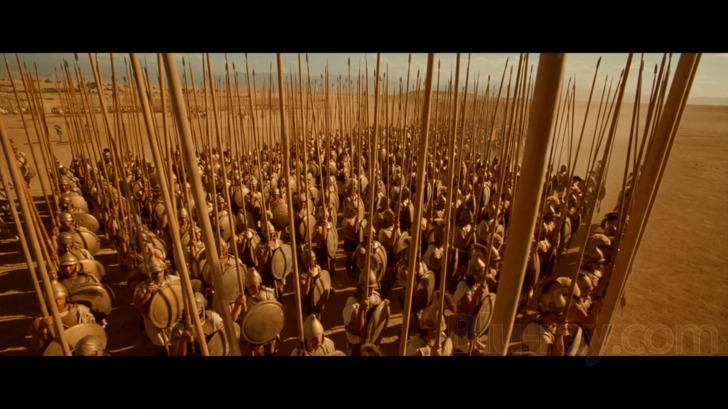
Alexander's 5.1 soundtrack, presented on both Blu-ray discs in lossless DTS-HD MA, provides thunderous impact to the two great battle scenes, with arrows flying, horses (and, in India, elephants) galloping, spears, sword and cudgels striking blows, and men yelling and screaming. The full surround array is engaged during such sequences, and the surrounds also lend powerful support to major crowd scenes when Alexander addresses his men or is entertained by his new allies, or when King Philip celebrates his engagement to a new wife or enters a ceremonial gathering where he is cheered by his subjects. Subtler effects can be heard when Alexander and the young Ptolemy stand atop the Himalayas and recall the story of Prometheus and his punishment at the hands of Zeus; the sounds of chill mountain winds are quietly audible on the soundtrack. Dialogue is generally clear, although Val Kilmer often slurs his words as Philip, usually for deliberate effect. The score by Vangelis (Chariots of Fire and Blade Runner) is majestic, lush and dynamic—by far one of the best elements of Alexander.
Alexander Blu-ray Movie, Special Features and Extras 
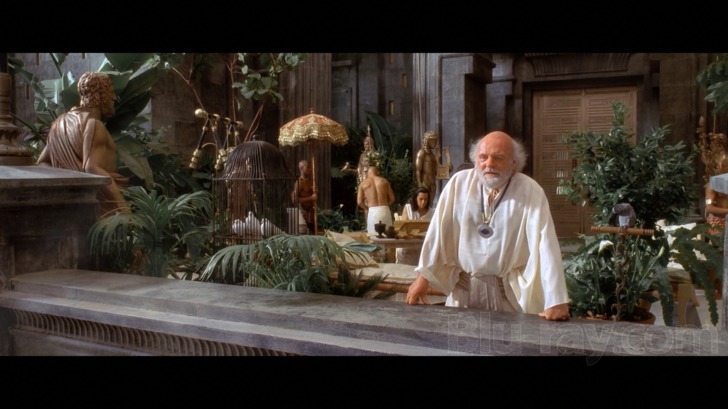
Ultimate Cut:
- Commentary with Oliver Stone: Perhaps the most striking feature of Stone's new commentary is that nowhere does he directly address the reason for revisiting Alexander anew after The Final Cut. Nor does he describe differences between The Final Cut and the new version. Instead, Stone talks continuously (or so it appears; the commentary has obviously been edited together from several sessions) about all aspects of the film, the actors and their performances, the production design and cinematography, the themes and imagery and, above all, the history, both known and inferred, of the historical Alexander and the people around him. Stone is frank about the many aspects of the story that had to be invented and the many uncertainties surrounding Alexander's life and especially his death (was he poisoned? if so, by whom?). As fascinating as much of Stone's presentation is, he too often sounds like someone trying to make a case for the film because the film is failing to speak for itself.
- The Real Alexander and the World He Made (1080p; 1.78:1; 29:45): This artfully constructed documentary features a collection of scholars enthusiastically discussing the historical Alexander and his accomplishments, based on their years of study. Stone also participates, as does his long-time collaborator, former U.S. Marine and military historian Dale Dye, who directed the second unit on Alexander.
- Fight Against Time: Oliver Stone's Alexander (480i; 1.85:1, enhanced; 1:16:13): This is the same documentary by Sean Stone previously included on Alexander Revisited: The Final Cut.
- Commentary with Oliver Stone and Robin Lane Fox: Fox is a historian of ancient Greece at Oxford University who served as historical advisor to the film. He and Stone were recorded separately and their comments edited together. Stone's observations on the structure of the Theatrical Cut are particularly interesting in light of his subsequent major revisions. Fox's description of some of the services he rendered to the production and his approving comments on the film's invented scenes provide an interesting perspective on the challenges of transforming history into narrative fiction, especially where the historical record itself is full of gaps.
- Resurrecting Alexander (480i; 1.33:1; 26:41).
- Perfect Is the Enemy of Good (480i; 1.33:1; 28:53).
- The Death of Alexander (480i; 1.33:1; 31:16).
- Vangelis Scores Alexander (480i; 2.39:1; 4:31).
- Trailers (480i; 2.39:1).
- Teaser Trailer (1:55).
- Theatrical Trailer (1:57).
- The Art of Alexander: A small book of storyboards, production stills and behind-the-scenes photos.
- Correspondence: Examples of letters written by Stone to the cast and crew, plus a letter written by Anthony Hopkins to Stone.
- Stone's Alexander: A Scholar's Perspective: A historical note by Ivana Petrovic, Senior Lecturer in Greek Lecturer at Durham University.
Alexander Blu-ray Movie, Overall Score and Recommendation 
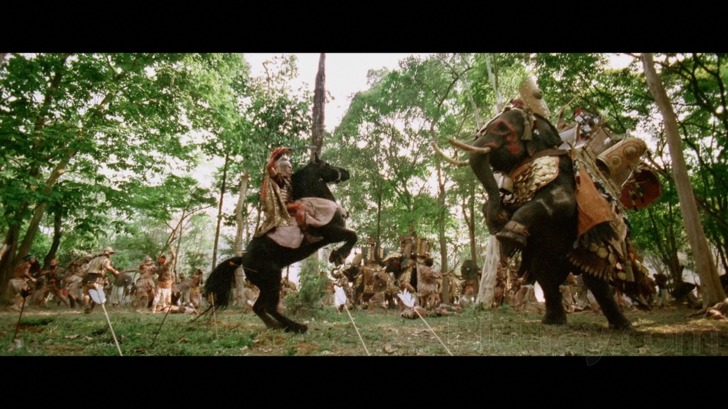
At several points in Alexander, Stone employs a technique he began with JFK and fully developed in Natural Born Killers that he calls "vertical editing". It allows a filmmaker to deepen an event—to descend, if you will, into its subtext—through inserts of images that are deliberately not part of the scene. At key moments in Alexander, when a character is speaking, we will see them for a flash as Alexander does: not speaking, but staring at him with mockery. A subordinate expressing anger will morph for a moment into the image of his father, Philip. The image of his devious mother will suddenly flash into Alexander's head. "Vertical editing" was one of Stone's most creative breakthroughs in the cinematic interweaving of story and subtext, but one must plan in advance to make the movie in that fashion. Otherwise, the necessary footage may not get shot. Stone's restless re-cutting of Alexander, and his steady retreat from the Theatrical Cut's chronological order, appears to be an attempt to impose "vertical editing" on a film that wasn't shot for it. The Ultimate Cut contains a number of powerful and impressive sequences, but as a whole, it lacks the impact of the Theatrical Cut. For anyone seeing the Ultimate Cut as their first encounter with Alexander, I strongly recommend first watching "The Real Alexander" documentary as an introduction. Otherwise, the Theatrical Cut is the place to start. For existing fans of the film, this two-disc set is an easy recommendation, because it's the only way to obtain the original version on Blu-ray. For those new to the Alexander experience, I suggest renting whatever version is easiest to get, and see whether it grabs your interest.
Other editions
Alexander: Other Editions

Alexander Revisited
The Final Cut
2004

Alexander Revisited
2004

Alexander Revisited
The Final Cut | Two-Disc Set
2004

Alexander
The Ultimate Cut
2004

Alexander
Theatrical Cut
2004

Alexander Revisited
The Final Cut 4K | Collector's Edition
2004
Similar titles
Similar titles you might also like

Troy
Director's Cut
2004

Kingdom of Heaven 4K
Director's Cut
2005

Spartacus: The Complete Series
2010-2013

Braveheart 4K
1995

Band of Brothers
2001

The Pacific
with Bonus Disc
2010

King Arthur
Director's Cut
2004

Centurion
2010

300 4K
2007

300: Rise of an Empire
2014

The Eagle
2011

Hacksaw Ridge 4K
2016

Flyboys
2006

Master and Commander: The Far Side of the World 4K
2003

Red Tails
2012

Gladiator 4K
2000

The Messenger: The Story of Joan of Arc
1999

The Patriot
Extended Cut
2000

We Were Soldiers 4K
2002

Spartacus: Gods of the Arena
2011
